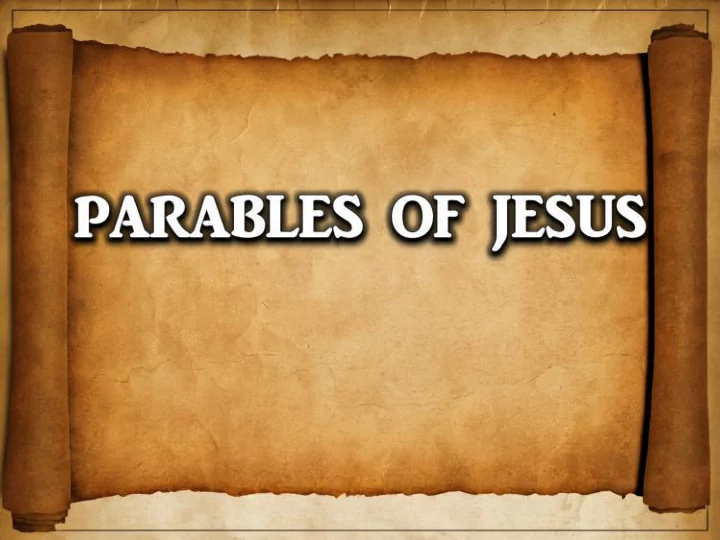

Luke 16:1-14
Jesus began speaking to His disciples (vs. 1). • The main characters are a rich man and his • manager (vs. 1). While neither of these man are named, both of • their roles were well understood in Bible times.
The master was a man of great wealth. The • very fact that he had a servant who managed his affairs demonstrates this. This signifies that he was a man of status, • position, and honor. The Lord calls him “rich” in verse 1. •
The steward was someone of considerable • authority. He was the sole manger of all that the master • had. He held the position of a business administrator. This means he could buy, sell, negotiate, and • do all the things that were necessary to manage the affairs of his master.
The steward “squandered” his master’s goods • (vs. 1). The evidence was so strong against him that it • was dismissed without delay (vs. 2). The steward did not even make a defense for • himself. He knew he was guilty!
Before being let go the steward was called to • give an account for his actions. The manager said to himself, ‘What shall I do, • since my master is taking the management away from me? I am not strong enough to dig; I am ashamed to beg. I know what I shall do, so that when I am removed from the management people will welcome me into their homes.’ (vss. 3-4)
The steward defrauded his master by • discounting those who owed his master. He gave them huge discounts (discounts that • accounted for large sums of money). He set up a system of crooked kickbacks for • all of his master’s debtors (vss. 5-8).
And he said, ‘A hundred measures of oil.’ And • he said to him, ‘Take your bill, and sit down quickly and write fifty.’ (vs. 6) The oil here probably represents olive oil. • Olive oil was very precious and expensive during this time. The steward cut this man’s bill in half (by several thousand dollars)! He decreased the bills of all of the men who were in debt to his master.
This was all about preservation! • The steward was looking out for his future. • The master praised the steward’s shrewdness • (vs. 8).
The steward was a wicked man. •
The steward was a wicked man. • The Lord never commends his wicked actions. •
The steward was a wicked man. • The Lord never commends his wicked actions. • This unrighteous steward is not commended • for his sins. He is commended for his shrewdness (vs. 8).
The Lord announces that men of the world • (wicked as they may be), are often wiser than those who claim to follow God. The people of this world (sons of the world) • are often wiser than the people of God (sons of light). The children of light (disciples) ought to show • as much forethought, planning and preparation as the children of the world.
The Lord mentions “unrighteous wealth” in • verses 9 and 11. This wealth is contrasted with “true riches” in verse 11. The unrighteous wealth is a reference to • earthly wealth that people put their trust in.
“No servant can serve two masters; for either • he will hate the one and love the other, or else he will be devoted to one and despise the other. You cannot serve God and wealth.” (vs. 13) Now the Pharisees, who were lovers of money, • were listening to all these things and were scoffing at Him (vs. 14).
Disciples should never put their trust in • material wealth. They need to use it to help prepare for eternity • (1 Timothy 6:17-19).
What does the Lord mean when He says, • “Make friends for yourselves by means of the wealth of unrighteousness?” (vs. 9)
What does the Lord mean when He says, • “Make friends for yourselves by means of the wealth of unrighteousness?” (vs. 9) What does He mean when He says, “when it • fails?”
What does the Lord mean when He says, • “Make friends for yourselves by means of the wealth of unrighteousness?” (vs. 9) What does He mean when He says, “when it • fails?” What are the “eternal dwellings?” •
There will come a time when money will fail • us!
There will come a time when money will fail • us! The “friends” are needy saints. •
There will come a time when money will fail • us! The “friends” are needy saints. • This parable is about trusting God and being • good stewards of our blessings (vs. 11).
There will come a time when money will fail • us! The “friends” are needy saints. • This parable is about trusting God and being • good stewards of our blessings (vs. 11). We need to be preparing for our spiritual • future. We need to be wiser than the world!
The unrighteous steward was wise enough to • make preparations for the future. Shouldn’t we be as wise?
We need to be righteous and good stewards of • our blessings (vss. 10-12).
We need to be righteous and good stewards of • our blessings (vss. 10-12). We also need to prepare for what is to come • (vss. 9, 11).
We need to be righteous and good stewards of • our blessings (vss. 10-12). We also need to prepare for what is to come • (vss. 9, 11). Now the Pharisees, who were lovers of money, • were listening to all these things and were scoffing at Him. (vs. 14)
Recommend
More recommend